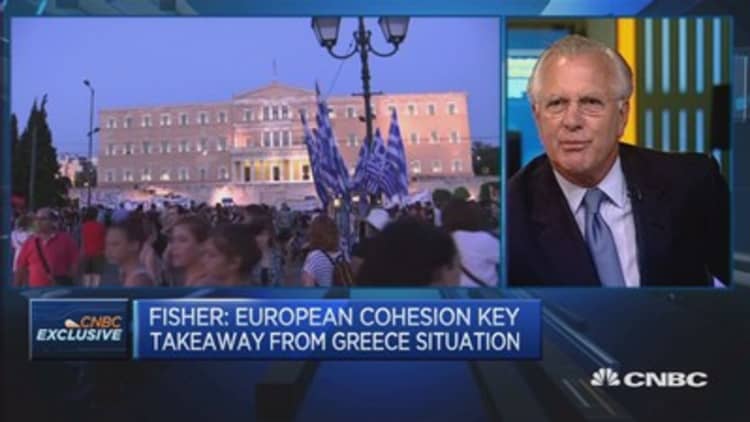
An interest rate hike by the U.S. Federal Reserve should come in September, Richard Fisher, former president and chief executive of the Dallas Fed, told CNBC Tuesday.
"The markets, to me, have already discounted a first rate rise and (Fed Chair) Janet Yellen has made it very clear it's being considered and is on the table," he told CNBC Europe's "Squawk Box."
"I would personally expect that the odds are highest for September. You don't want to do something in December because that's when the markets are so thin and you could have a reaction that is perhaps more exaggerated."
Following the financial crisis, the Fed cut interest rates to record lows and implemented quantitative easing (QE) in an effort to stimulate growth in the U.S. economy. When the country's economy started to pick up last year, the Fed tapered off its monthly bond-buying program and now all eyes are on the first rate hike.
Fisher said this would be a slow process, but needed to begin sooner rather than later.
Fisher was known for being a policy "hawk" (opposed to further easing) during his time at the head of the Dallas Fed, from 2005 until his retirement in 2015 and has previously called for a "prompt" rate hike.
Read MoreFed's Dudley: September rate rise 'very much in play'
'Uber-accommodative policy'
When asked whether the Fed should have hiked rates already, Fisher laughed that he had "already lost that argument."
"I can only tell you what I advocated which was: 'Let's do one rate hike and wait and see how it's digested.' We will still have uber-accommodative monetary policy in the U.S," he said.
The Fed's reluctance to increase interest rates to date has been put down to concerns from more "dovish" members of the Fed's monetary policy committee (FOMC) that such a move could damage the economic recovery.
The U.S. economy stalled in the first quarter of 2015, decreasing at an annual rate of just 0.2 percent -- a far cry from the 2.2 percent growth recorded in the fourth quarter of 2014.
Read MoreFeddoesn't have 'smoking gun'
The Fed has always said a hike would depend on improving U.S. employment data and the rate of inflation moving towards 2 percent. U.S. consumer prices increased 0.4 percent in May, according to the Bureau of Labor Statistics.
Speaking to CNBC Tuesday, Fisher conceded that monetary policy "takes a great deal of time to work itself into the system."
"I view it as a large tanker at sea that takes a long time to turn, with highly-explosive fuel on board – these excess reserves they've piled up on the Federal Reserve's balance sheet of $2.65 trillion," Fisher said.
He added that it was "only a matter of time" before a rate hike. "Even if we have a raise of 25 basis points in September, that doesn't mean it would follow through (with another rise) at the next meeting."
- By CNBC's Holly Ellyatt, follow her on Twitter @HollyEllyatt. Follow us on Twitter: @CNBCWorld.


